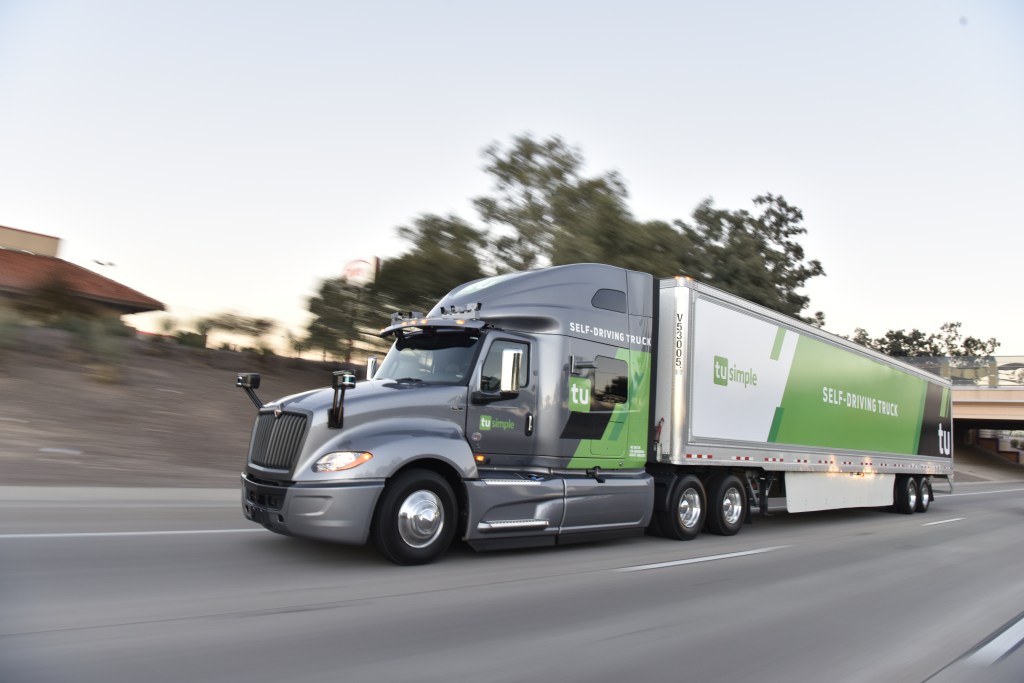Another autonomous-vehicle unicorn has joined the herd.
TuSimple, a self-driving truck startup running daily routes for customers in Arizona, has raised $95 million in a Series D funding round led by Sina Corp. as the company prepares to scale up its commercial autonomous fleet to more than 50 trucks by June.
The startup, which launched in 2015 and has operations in San Diego and Tucson, Arizona, has a post-money valuation of $1.095 billion (aka unicorn status). TuSimple has raised $178 million to date in rounds that have included backers such as Nvidia and ZP Capital. Sina, operator of China’s biggest microblogging site Weibo, is one of TuSimple’s earliest investors. Composite Capital, a Hong Kong-based investment firm and previous investor, also participated in this latest round.
TuSimple launched when the burgeoning AV ecosystem of investors, academics turned entrepreneurs and early self-driving tech pioneers were focused more on the development of autonomous passenger vehicles, namely robotaxis.
Autonomous trucking existed in relative obscurity until high-profile engineers from Google launched Otto, a self-driving truck startup that was quickly acquired by Uber in August 2016. Then came the reveal of the Tesla Semi and the founding of several autonomous trucking startups, including Starsky Robotics and Embark.
Suddenly, it seemed people had woken up to the economic opportunity that could be achieved — just maybe — with trucks.
Meanwhile, TuSimple quietly scaled. In late 2017, TuSimple raised $55 million with plans to use those funds to scale up testing to two full truck fleets in China and the U.S. By 2018, TuSimple started testing on public roads, beginning with a 120-mile highway stretch between Tucson and Phoenix in Arizona and another segment in Shanghai.
“Autonomous driving is one of the most complex AI systems humans have ever built. After three years of intense focus to reach our technical goals, we have moved beyond research into the serious work of building a commercial solution,” TuSimple founder, president and CTO Xiaodi Hou said.
Today, TuSimple is taking three to five fully autonomous trips per day for customers on three different routes in Arizona. All of these trips have two safety engineers, one who is behind the wheel, and another monitoring the data pouring in during each trip. TuSimple says these daily trips allow it to earn revenue while it validates its Level 4 autonomous system, a designation by SAE that means the vehicle takes over all of the driving in certain conditions. TuSimple has 12 contracted customers.
Now, it’s ready to ramp up further, in terms of its fleet size and partnerships. TuSimple plans to expand its daily “fully autonomous” commercial deliveries to Texas. The company also plans to use this influx of capital to fund what it describes as “critical joint production programs” with OEM, Tier 1 suppliers and sensors partners. Truck manufacturing suppliers are working with TuSimple on the integration of autonomous software with powertrain, braking and steering systems. The company says this is “an essential step for the commercial production and operation of self-driving trucks.”
TuSimple isn’t disclosing its customers or even suppliers yet. Although, TuSimple did reveal last month at CES that it’s working with Tier 1 supplier Cummins Inc. to enable powertrain integration with its autonomous technologies.
TuSimple’s focus on cameras
Other AV companies, namely low-speed autonomous passenger vehicles, have focused on LiDAR (light detection and ranging lasers) to improve the perception of the vehicle, arguably one of the most difficult tasks of automated driving. But for TuSimple, “laser isn’t the sauce.”
Instead, TuSimple has developed a camera-centric perception solution. The company does use LiDAR for its mapping and some data collection. However, LiDAR has its limitations in the high-speed world of trucking, Hou explained to TechCrunch in a previous interview.
Even its name, which is an interlingual pun that essentially means “simple image” or simple image analysis, affirms TuSimple’s approach.
It appears that has paid off. LiDAR can detect objects like cars to about 250 meters, although the optimal quality falters past 150 meters. TuSimple says its camera-based system has a vision range of 1,000 meters.
As a reluctant participant in AV demos, this TechCrunch reporter headed to TuSimple’s Tucson operations recently armed with lots of curiosity and a healthy dose of skepticism.
The TuSimple truck, two safety engineers in the front and Hou and myself in the back of the cab, entered into autonomous mode in the company parking lot as it approached a surface road. From here, the truck drove the route in autonomous mode for the entire 65-mile or so trip. This route began with a left turn onto a surface road, then onto an unprotected left at a traffic light, a railroad crossing and finally an entrance onto the highway. The truck continued for 30 miles before exiting the interstate, then maneuvering back onto the highway for the trip back.
A display in the cab allowed us to see what the truck was seeing, or more specifically what the camera-based system sees. TuSimple’s camera combined with software algorithms allows the system to track distance, relative speed and vehicle type of the various objects spotted while on the road, and has an intention prediction feature that allows the vehicle to understand what those objects might do.
The end result, at least for this demo, was a ride-along in an autonomous truck that was able to accomplish a number of complicated tasks, including anticipating congestion ahead and making a lane change in a smooth, uninterrupted movement — no disc braking necessary.































Comment